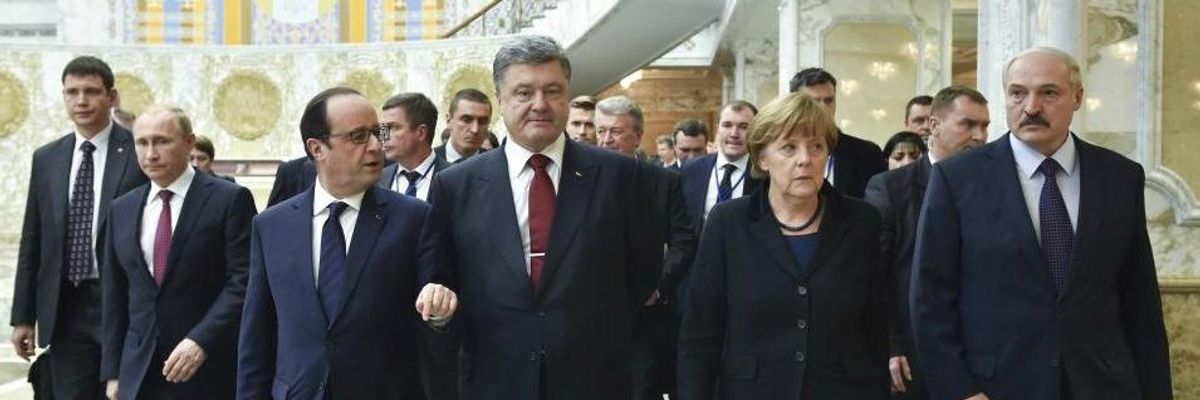Following marathon overnight talks in Minsk, Belarus that began Wednesday, world leaders emerged near dawn to announce that a cease-fire agreement has been reached to at least temporarily stop the fighting in eastern Ukraine with stated hopes that a long-term political solution will follow.
Spurred by a renewed effort by German Chancellor Angela Merkel and French President Francois Hollande, the talks brought Ukraine President Petro Poroshenko to the table with Russian President Vladimir Putin to negotiate on behalf of rebel forces in the east who have refused to submit to the authority of the Kiev government following a coup last year.
It was Putin who first declared that more than 16 hours of negotiations had yielded substantial progressive and the agreement of a cease-fire that would begin on Saturday. "We have agreed on a ceasefire from midnight 15 February," Putin told reporters early Thursday.
For his part, Poroshenko said, "The main thing which has been achieved is that from Saturday into Sunday there should be declared without any conditions at all, a general ceasefire."
That news will come as welcome relief to those in the eastern region of the country, where ongoing fight over the last year has claimed more than 5,000 lives, forced people from their homes, and resulted in a widespread humanitarian crisis.
Alexander Zakharchenko, a rebel leader from the Donetsk region, according to Reuters, called the treaty a "major victory for the Luhansk and Donetsk people's republics." And Igor Plotnitsky, part of the delegation from Luhansk, said the deal would "give Ukraine a chance, so that the country changes its constitution and its attitude."
Merkel said the agreement should be seen as a "glimmer of hope," but said it should be clear to all that there remains much work and reconciliation before real and lasting peace is achieved. "On balance," Merkel said, "I can say what we have achieved gives significantly more hope than if we had achieved nothing. So one can say that this initiative was worth it."
In her statements, Merkel made it clear Putin had been instrumental in pressuring the factions in the east to accept the terms of the truce.
Dilineated by the Guardian, the key points of the agreement are:
- Ceasefire to begin at midnight on 15 February
- Heavy weapons withdrawn in a two week period starting from 17 February
- Amnesty for prisoners involved in fighting
- Withdrawal of all foreign militias from Ukrainian territory and the disarmament of all illegal groups
- Lifting of restrictions in rebel areas of Ukraine
- Decentralisation for rebel regions by the end of 2015
- Ukrainian control of the border with Russia by the end of 2015
Despite the progress, many remain skeptical that the new agreement will hold, given the deep distrust between Kiev and the eastern factions and the widely divergent narratives that persist over who is the aggressor in the conflict.
Noticeably absent from the talks was any representative from the United States, despite the outsized roll played by the U.S. in backing the Kiev government and in terms of applying pressure on Russia to change its stance on Ukraine. Having recently stated that it was seriously considering sending a large shipment of weapons to the Ukraine military, it was clear that both France and Germany warned against such provocations and the U.S. absence from the talks in Minsk appeared to signal that the Europeans are determined to take the lead as they try to resolve the crisis without further military escalation.
As analysts and former leaders have boldly stated, the emergence of a new Cold War between the nuclear powers of the U.S. and Russia is in nobody's interest, least of all the Ukrainians.
According to Angus Roxburgh, a journalist who has covered the region extensively and once served as adviser to the Russian government, this new agreement symbolizes a "make-or-break moment" for Ukraine and outside parties should do everything possible not to sabotage the prospects of a lasting settlement. Roxburgh writes:
It is to be hoped, therefore, that the US will reconsider its plans to send a battalion of troops to Ukraine next month to start training Ukrainian forces. The situation is far too fragile, and the stakes are too high, for such easily misinterpreted moves. The same goes for any thoughts about sending arms, even defensive ones, to Kiev.
As the International Institute for Strategic Studies warned this week, "a decision by the west to provide arms to Ukraine could prompt a rapid escalation of Russian support for separatists battling government forces in the east of the country". That is why Chancellor Merkel rushed into action last week, desperately hoping to achieve an agreement before the Americans raise the stakes. She understands, better it seems than any other western leader, that this is a make-or-break moment. If cool thinking does not prevail, on all sides, the consequences for Europe could be cataclysmic.
